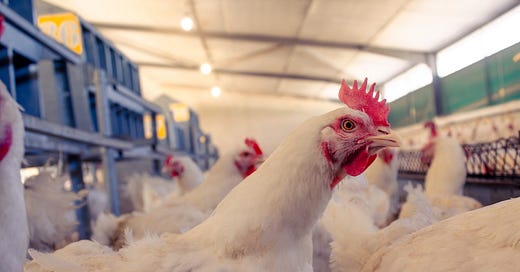Chicken Politics in South Africa
Some points to keep in mind as you read about the poultry imports "crisis."
The poultry industry has been a central focus of South Africa's trade discussions for over a decade. The debate has primarily centred on balancing imports and policy space to cushion the domestic industry in its efforts to expand.
Over the years, the domestic poultry industry has increased its production.
But poultry, being one of the most affordable proteins in the country, also faces rising demand. As a result, South Africa remains a net importer of poultry products. This import exposure always raises a range of concerns when there are glitches in the supplying countries.
One of the issues I have noted circulating in the South African media over the past few days is a general discussion about the potential price increase in poultry-related products and the possible supply crunch.
This conversation arises on the back of the temporary restrictions on imports of poultry products from Brazil. This ban comes on the back of an outbreak of avian influenza in Brazil. A typical approach when such outbreaks occur is to restrict imports until there is comfort that the risk can be contained. China and the EU are among the countries that restricted poultry products from Brazil before South Africa took action. Therefore, this is not a protectionist approach but rather a response to a global norm when such outbreaks occur.
Now, while South Africa is an agricultural powerhouse and a net exporter, exporting just under US$14 billion of farm products annually, the country still imports about 20% of its annual poultry consumption (roughly 350,000 tonnes of various products). The suppliers for various cuts include Brazil, the United States, Argentina, and the European Union. However, Brazil has a sizable share in imports, around 70% annually.
In recognition of Brazil's significant influence on our poultry supply, some food processors have understandably raised concerns about potential supply chain disruptions. The intention, I believe, is to urge the South African regulators to soften the restrictions and not apply a broad approach to Brazil. After all, the country is mainly in the state of Rio Grande do Sul. Therefore, it makes sense to call for a regionalised ban and still allow trade to continue.
Still, we must appreciate that the restriction on Brazil's poultry imports into South Africa is not a permanent policy approach. This is to facilitate the assessment of their avian influenza outbreak before considering a regionalised approach to restrictions, limited to the affected areas of Brazil rather than the entire country. From my interactions, I am aware that the South African authorities are open to this discussion, and a process is underway to assess the same issue.
Once such an assessment is complete, the scientists will advise on the appropriate policy approach. The temporary ban is necessary to prevent the transfer of any diseases and protect domestic poultry production. This regional approach is also a policy direction that Namibia has followed.
Of course, these are decisions by scientists, and they must be given space to make that assessment. It is from this perspective that I worry about the constant news flow that suggests that South Africa will face a food crisis if we temporarily limit Brazil's poultry imports.
It would be highly beneficial to provide regulators with valuable insights and data on imports, as well as potential considerations for the future so that they can make informed decisions.
Indeed, a ban on imports is costly and may have implications for jobs in the importing businesses if it remains in place for an extended period. Importantly, if it stays in place for a long time, it may also present cost pressures to consumers. But this is not a path South Africa desires. South Africa generally has an open market approach, and once there is comfort about the disease risks, the Namibian approach could also be applied.






